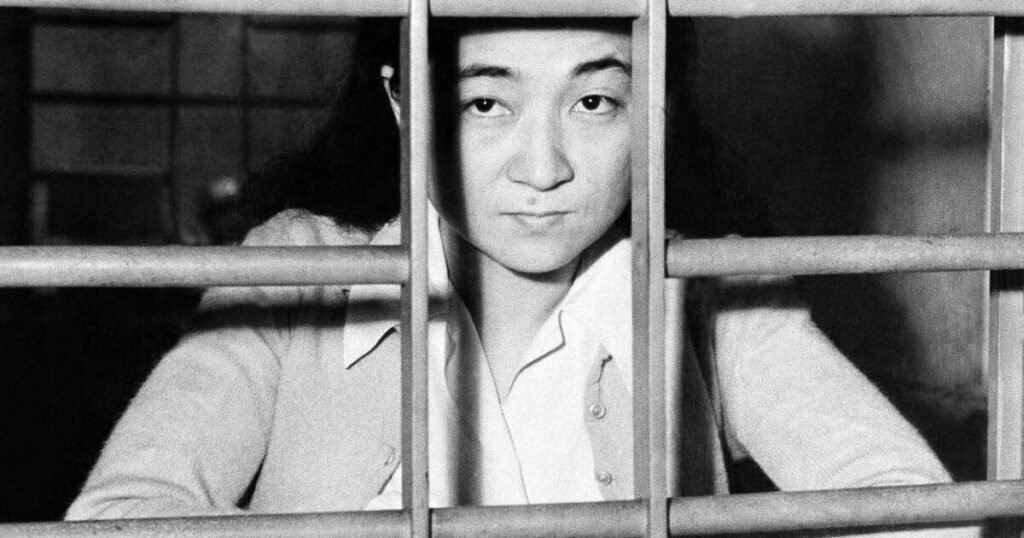As World War II ended in the summer of 1945, journalists went looking for the siren of the Pacific in the ruins of bombed-out Tokyo. They were hunting for Tokyo Rose, the owner of a voice that sought to sap military morale by spreading propaganda through countless scratchy Allied radios.
Her identity was a mystery, and journalists rushed to uncover it. They found a soft-spoken woman from Los Angeles who loved America.
Her name was Iva Toguri D’Aquino, and she was born in Watts to Japanese parents in 1916 and had a degree in zoology from UCLA. She wanted to be a doctor. But she traveled to Tokyo in 1941 to care for a sick aunt, with disastrous timing. She made the trip without a passport, which doomed her desperate efforts to board a ship home as the war erupted.
She was trapped in a country not her own and hounded by police who were suspicious of her loyalty because she refused to renounce her American citizenship. Neighbors and authorities harassed her relatives for harboring her; she moved out to spare them further pain.
She could not read Japanese and spoke it spottily. But she found a job as a typist at Radio Tokyo, which enlisted POWs in its propaganda division and recruited her in late 1943 as a disc jockey.
In a melodic, chirpy voice, speaking in unaccented American English and calling herself Orphan Ann, D’Aquino did done hundreds of broadcasts for a news and music show called “Zero Hour.” She would address the troops as “My boneheads in the South Pacific.”
She was “a betrayer of her native land and a betrayer of her government in time of need,” a federal prosecutor would call her. She was a “turncoat and a female Benedict Arnold.”
D’Aquino’s defense: She had been slyly subverting the propaganda machine the whole time, entertaining Americans with facetious language no one could take seriously and introducing upbeat American music the GIs actually loved. (A postwar questionnaire found the vast majority of troops regarded “Zero Hour” as harmless entertainment, rather than psychological poison.)
Tried for treason in San Francisco and sent to prison for six years, D’Aquino became synonymous with the name “Tokyo Rose,” inextricably linked to a lingering wartime myth even as she tried to lead a quiet life and reclaim her name.
The case against her was threadbare, a product of postwar rancor, false testimony and manipulative journalists who had preyed on her naivete. Ironically, her stubborn patriotism also helped damn her; if she had renounced her American citizenship, as the wartime Japanese government demanded, she would not have been prosecutable.
In reality, Japanese propaganda chiefs had pressed more than a dozen English-speaking women into radio service. The plan was to demoralize war-weary, homesick troops scattered around the Pacific theater. The women broadcast from Taipei, Tokyo, Seoul and Bangkok. Some spoke of the hopelessness of the fight against Imperial Japan. They urged American fighting men to quit. They stressed the certain unfaithfulness of wives and girlfriends back in the States.
None of the women went by “Tokyo Rose” — it was a composite, a nickname used by GIs who never knew how many there were. And it was in use before Iva Toguri D’Aquino reached the broadcast booth herself.
After Japan’s surrender, journalists were eager to find three people: Emperor Hirohito, former Prime Minister Hideki Tojo and the mythical broadcaster with the evocative name.
“Those are the three names that most Americans knew, even though there was no Tokyo Rose and nobody ever called themselves that,” Ron Yates, a former Chicago Tribune reporter who covered the case, told The Times in a recent interview.
Two American journalists found Iva Toguri D’Aquino in Tokyo and promised her $2,000 for the exclusive rights to her story. Desperate for money, she signed a contract attesting that she was “the one and only Tokyo Rose.” She never got the money; instead, she became a flash point for postwar anger.
The American government in Japan threw her in prison for a year, before deciding there was no case against her. But rancor reignited when she tried to return to the States with her husband, a Radio Tokyo journalist whose name she had taken. She was pregnant and wanted their baby to be born in America.
The Los Angeles City Council voted to bar her return, her child died at birth and Gold Star Mothers raised a furor at the prospect of her return. Walter Winchell, the feared and powerful gossip columnist, raged against her.
“They said, ‘Here’s Tokyo Rose coming back, and my son is not,’” Bill Kurtis, a longtime CBS journalist who covered her story and befriended her, said in a recent interview. “So they apply the pressure. The whole U.S. just hated Japan even after dropping the two bombs. She didn’t have a chance because of the anti-Japanese feelings.” He added: “She was the unluckiest person I’d ever heard of.”
With pressure mounting on the Truman administration, D’Aquino was hauled to federal court in San Francisco to face eight counts of treason in 1949, the same year another jury had convicted her supposed Nazi counterpart, the so-called Axis Sally, of treasonous broadcasts from Berlin.
Testifying on D’Aquino’s behalf was Charles Cousens, a major in the Australian army who had been captured by the Japanese and forced to work at Radio Tokyo. He said she had smuggled food and medicine to Allied POWs. He had recruited her for “Zero Hour,” he explained, because he thought her “gin-fog” voice would help create a “complete burlesque” of a propaganda show.
Cousens had written her scripts, and offered a sample:
Hello there, enemies. How are tricks? This is Ann of Radio Tokyo, and we’re just going to begin our regular program of music, news and the “Zero Hour” for our friends — I mean our enemies — in Australia and the South Pacific. So, be on your guard and mind the children don’t hear! All set? Okay. Here is the first blow at your morale, the Boston Pops playing “Strike up the Band.”
The star prosecution witnesses were Kenkichi Oki and George Mitsushio, two California-born men who had become Japanese citizens and supervised her at Radio Tokyo. With implausibly identical language, they testified that they had heard her speak of sunken Allied ships after a naval battle in October 1944:
“Orphans of the Pacific, you are really orphans now. How will you get home now that all of your ships are sunk?”
On the stand, D’Aquino vehemently denied ever saying it, and no recording of the transmission existed. It was the sole count on which jurors found her guilty, after a 13-week trial. Years later, Judge Michael J. Roche remarked, “I always felt there was something peculiar about that girl’s going to Japan when she did. I always thought she might have been up to something.”
On her release, six years later, a Chicago Tribune headline read: “Tokyo Rose Quits Jail, Shows No Repentance.” She fended off deportation proceedings and went to work at the family gift store in Chicago. (During the war, her parents had been wrenched from their home and imprisoned in the Gila River Camp in Arizona, where her mother died.)
In the mid-1970s, the Tribune reporter Ron Yates, then working in Tokyo, looked into the case.
“It hit me how flimsy the evidence was against her,” Yates said. He tracked down the government’s two star witnesses. They admitted that the FBI had pressured and coached them. They recanted their damning testimony about the sunken-ship broadcast.
“They were told what to say,” Yates said. “She never said anything like that, they told me. They told me that straight out … These guys were convinced they would be hanged themselves.”
D’Aquino filed a petition for a presidential pardon, to restore her stripped U.S. citizenship. “Age is creeping up on me and I can’t wait forever,” she said. “America is my home. It will always be my home.” The state of California belatedly lent its support. President Ford granted the pardon in 1977.
Yates asked her if she could ever forgive the two men who testified against her.
“Never,” she said.
At one point, Yates said, he and D’Aquino planned to write a book about her experience. He told her she should go on Oprah. “She was terrified of that,” Yates said. “She was terrified people would throw bombs into her store.”
Yates said that his own father, a former serviceman, remembered hearing Japanese propaganda broadcasts during his time in the Pacific during World War II.
“My father said, ‘I listened to her and she said terrible things.’ I said, ‘There were 14 of them.’ I had to disabuse him of this. I said, ‘Dad, it was a lie.’”
When D’Aquino’s husband came to the United States to testify for her at her trial, the U.S. government demanded that he promise never to return. This effectively kept her from her husband for the rest of her life. He found another woman. Until her death at age 90 in 2006, she did not remarry.
She never got over him, said Barbara Trembley, a film producer who has tried to make a film about D’Aquino’s life.
“It’s a terribly tragic love story — she was really in love with him,” Trembley said. “She felt she’d brought him very bad luck.”
In an article in Reason magazine, the historian James J. Martin described the case as a “glittering press agent’s spectacle aimed at trying the personification of a World War II soldier’s legend, not a person with civil and constitutional rights.” It was an illustration, he argued, “that the word ‘treason’ is far more a political term than it is anything else.”
Long after she went free, D’Aquino lived with the stigma — and carried the peculiar allure — of the moniker history had saddled her with. For years, letters poured in, threatening death and offering marriage.
“Every time the case is recalled in the papers,” she would say, “I seem to hear from every maniac in the country.”
The post This L.A. woman was jailed as a WWII traitor. How a pair of perjuries ensnared ‘Tokyo Rose’ appeared first on Los Angeles Times.




